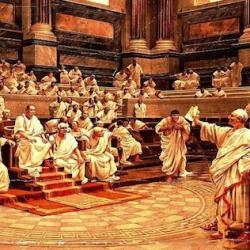In an essay on covenant as a political concept, Daniel Elazar briefly traces the development of covenant, and its relation to natural law, from Philo to Spinoza. Reformed theorists like Althusius loom large, what with their recovery and expansion of the biblical conception of “covenant.”
Elazar writes, “The federal theology which they articulated (federal is derived from the Latin foedus, which means covenant) stimulated the renewed political application of the covenant idea which was given expression first by political theologians and then by political philosophers such as Althusius and in the next century was secularized by Hobbes, Locke, and Spinoza. By the late seventeenth century, the concept had come full circle with its political dimension having taken on an independent life of its own.”
The synthesis of covenant with natural law was one expression of the larger synthesis of biblical with Greco-Roman conceptions, and this synthesis forms one of the sources of modern notions of natural right. As Elazar says, “Partisans of classic political philosophy view this transformation as a betrayal, gutting, or simple falsification of both classical and medieval natural law theories. Leo Strauss has made the strongest case for this view in Natural Right and History.”
Though this is correct in one sense, “it is possible to look upon the transformation in another way, namely the covenantalization of political philosophy. That is to say, the recognition of the power of the philosophic tradition in shaping the idealized frameworks of western man which had led to an intolerable gap between ideal and reality in everyday life and therefore the necessity to reconstitute the natural law idea within a new system derived from very different premises. That indeed is what Hobbes, Spinoza, Locke, among others, try to do. The end result was modern liberal democracy.”
Spinoza was key: “He knocked the props out from under the edifice of medieval philosophy in an effort to replace it with a new secular modernism. Whatever his intentions, in his effort to create an entirely new system, what we have come to call modern thought, he opened the door for the resurrection of the primacy of covenantal thinking.”












